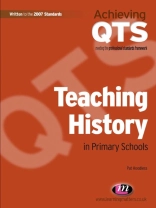This book introduces trainees and newly qualified teachers to the teaching of history in primary schools, and covers key concepts, skills and knowledge for the history curriculum at Foundation Stage, KS1 and KS2. Contents include planning, teaching and learning strategies, assessment, reflection and evaluation, as well as a range of practical ideas for classroom activities and cross-curricular themes. Each chapter is underpinned by national and international research; also included are links to important themes such as citizenship, out-of-school learning, sustainability, diversity and inclusive practice. Throughout, content is related to new initiatives such as Every Child Matters and Excellence and Enjoyment.
Daftar Isi
Introduction: why teach history in primary schools?
Knowledge and understanding of primary history
Guidance and support for Key Stage One and Key Stage Two
Planning for progression and opportunities for the development of key skills
Understanding and using teaching strategies in primary history
Monitoring and assessment
Resourcing primary history and collaborative working
Making the most of links with literacy and mathematics
E-learning and ICT in primary history
Creative and innovative approaches: history in the Early Years Foundation Stage
Creativity and cross-curricular links in Key Stages One and Two
Equality, inclusion and diversity as part of the history curriculum
Contexts for out-of-school learning in history
Tentang Penulis
Until her recent retirement Pat was a Senior Lecturer in history and education at the Institute of Education, Manchester Metropolitan University. Her main research interests lie in the teaching of time and chronology and the links between language and history in the primary school. She has written a number of papers for journals, and published book on primary history. She has also acted as a consultant for the QCA, CBBC and Mixicolore.












